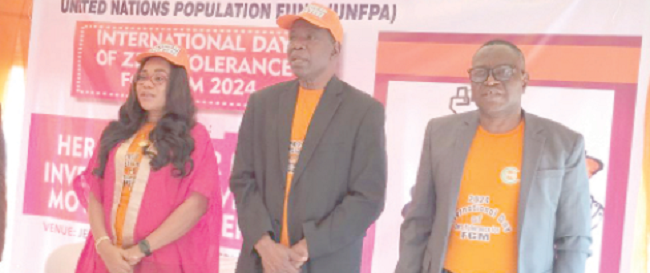DIRECTOR of the Centre for Comprehensive Promotion of Reproductive Health, Professor Oladosu Ojengbede, has stated that female genital mutilation (FGM), the removal of a woman’s or girl’s clitoris, is not only unhealthy but also unnecessary if it is not carried out.
Ojengbede, a consultant obstetrician and gynaecologist, speaking at the 2024 International Day for Zero Tolerance for FGM in Nigeria, organised by the centre in collaboration with the Oyo State government at the Jericho Nursing Hospital in Ibadan, said the removal of the clitoris and other parts of the female genital organ also leaves its victims suffering in silence.
According to him, “When the genital is cut off, it deadens the place, making sexual arousal impossible. Many young girls end up bleeding profusely, suffering chronic illness, or dying.
“When the whole vagina is completely closed, not only is sexuality affected, but menstruation may not be able to come out, thus making the woman a target of repeated infections that can lead to infertility even after marriage.
“The women are just quiet; they are suffering in silence for what they know nothing about and for what has happened, which does not need to happen. It is against good health to remove it because the presence of that external genital is good for health.”
Professor Ojengbede, however, urges the affected women to come out for free surgical repairs, adding, “We just repaired many women, including a woman who had a cyst on the area where the clitoris was removed, which was almost the size of a lawn tennis ball.”
Gender and FGM analyst for the South West Nigeria at the United Nations Population Fund (UNFPA), Mrs Uzoma Ayodeji, declared that more than 200 million girls and women alive today have undergone FGM, adding that in 2024 at least 4.4 million will be mutilated if efforts are not intensified to stop the harmful practice.
According to her, stopping the harmful practice also requires that FGM survivors amplify their voices to ensure their stories are heard on how FGM has affected them and to further help ensure the prevalence of FGM in Oyo State further down.
Mrs Tomi Popoola, representative of the Oyo State Ministry of Justice, said that FMG was a crime punishable under Nigeria’s law, but beyond persecuting its perpetrators, the focus should be more on providing special care for FGM survivors at different stages of life.
Early, Oyo State Primary Health Care Board representative, Dr Johnson Osokor, stated the importance of stemming FGM, being a culture that affects every aspect of survivors of FGM and a contributory factor to leaking urine and faeces in some women, infertility, and broken homes.
Also, Mrs Balikis Olawoyin, a staff member of the Oyo State Primary Health Care Board, applauded the survivors’ courage to come out to talk about FGM and urged them to come out for repairs and form a survivor’s group to join the crusade to end FGM in Nigeria.
